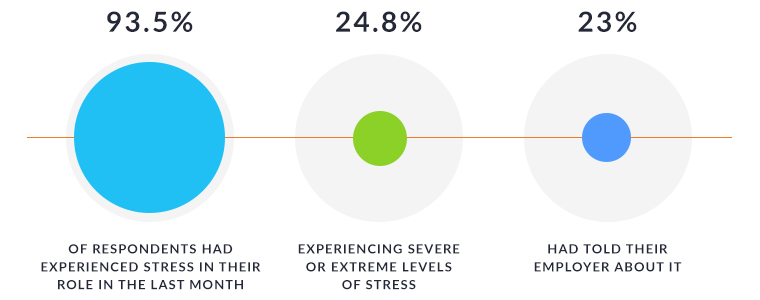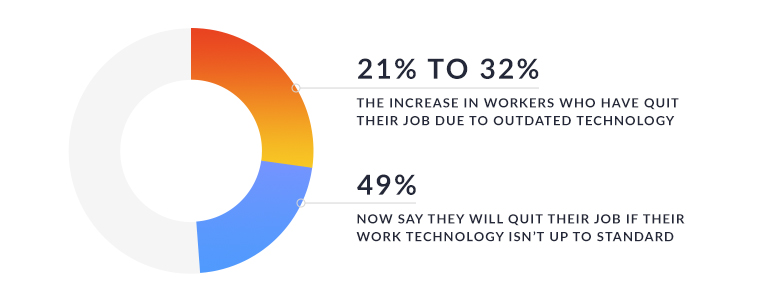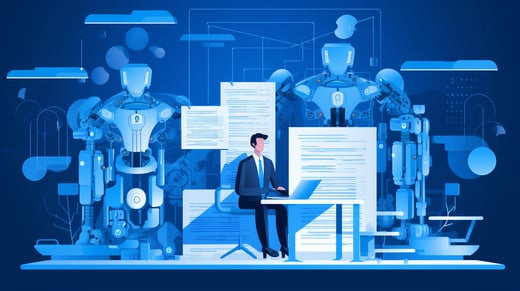New digital capabilities can help businesses meet the expectations of a younger workforce and win the war on talent.
Time for a cultural change

The legal industry has historically taken perverse pride in its culture of long hours and no complaints. Like a reluctance to use plain English and a preference for legalese, it seemed like this anachronistic working environment would remain part of our profession for ever more.
But times are changing, and fast. The confluence of new workforce expectations, digital disruption and a global pandemic means companies can no longer expect their legal staff to work gruelling schedules without losing them to more enlightened competitors. A new way of working is required – and legal technology provides the answer.
The old guard may try to counter that this is nonsense. They may maintain that when you sign up for a career in law, Stakhanovite work schedules are part of the deal. If you want to serve your clients with maximum effect, whether internal or external, you have to put in the hours. And if you don’t like it, well… you know where the door is.
However, that kind of culture is no longer acceptable. HR has reined in the worst excesses of the old workplace bullies; companies know they cannot push their people to the limits anymore. But it’s not just about that. The whole workplace has changed.
Legal tech is perfectly positioned to allow legal teams to meet businesses’ rising demands without suffering from excess pressure and burnout. Legal tech will ultimately lead to less stress, less boredom and less frustration. It will allow lawyers to focus on the tasks that they enjoy, and bring greater rewards to the company. And they will allow over-burdened lawyers to achieve a more sustainable work-life balance.
Workforce expectations have evolved
As millennials and Generation Zers inevitably become the majority in the workplace, they bring with them different expectations in terms of work culture. And, as their influence grows, more senior colleagues are also changing how they want to work.
The notion that the younger generation are slackers is wide of the mark. Research shows that they’re typically workaholics and actually work longer hours than their older peers. And they’re not prepared to put up with brutal working environments indefinitely.

Studies have shown that Millennials value a positive work-life balance even more highly than wages and job progression. What’s more, they have zero tolerance for workplace bullying. And when they don’t like it, well… they know where the door is too, and they’re not afraid to use it.
Gallup studies have shown that Millennials are three times more likely to quit their job at any given time than their non-Millennial counterparts. Easier access to employment information means that Millennials are more aware of job opportunities elsewhere, and are not willing to put up with unsatisfactory conditions.
The importance of mental health
At the same time, there is a greater focus on mental health than ever before. What was once a taboo topic is now the subject of research and wellbeing initiatives.
Studies carried out by the American Bar Association have shown that over a quarter of attorneys suffer from depression and one in five reports symptoms of stress.

In the UK, the findings are even more extreme; in studies carried out by the Junior Lawyers Division of the Law Society of England and Wales:
- 93.5% of respondents had experienced stress in their role in the last month
- Almost a quarter (24.8%) experiencing severe or extreme levels of stress
- Yet only 23% had told their employer about it
Problems like burnout, stress and isolation have become hot-button issues. And if research from Microsoft is to be believed, 40% of global workers are prepared to quit their jobs if the situation doesn’t improve.
This raises the prospect of a catastrophic talent drain. Even before the pandemic, we were reading stories about solicitors at Magic Circle firms quitting to become ski instructors. But if we don’t put proper working practices in place, and bow to the growing pressure from Millennials to address working hours, this will be a trickle compared to the flood that will pour down on the industry.
If you’re not convinced, check out this recent research that found that 80% of law students are now open to alternative careers.
The benefits of legal tech
In this context, access to best-in-class technology is crucial. Today’s employees demand a digital-savvy workplace, and this has only increased as a result of COVID-19.
Research published in technology magazine Information Age shows that in the 12 months to May 2021, the number of workers who have quit their job due to outdated technology increased from 21% to 32%. In fact, nearly half of all UK workers (49%) now say they will quit their job if their work technology isn’t up to standard.

But rather than viewing this as a threat, employers should look upon technology as a major opportunity. A burgeoning suite of digital innovations have come along all at once, designed to make legal teams smarter, learner and more efficient.
Legal tech is designed to remove the tedious grind and drudgery from lawyers, allowing them to focus on tasks which are more rewarding – both emotionally and financially.
Let’s look at two use cases where legal tech makes a tangible difference.
1. Automating contract reviews
Take contract reviews, for example. They are an unavoidable part of every contracting process, but they’re also time-consuming and monotonous. The problem is that a lawyer doesn’t know which parts of the contract will contain risk unless they read the whole document. Therefore hours are spent reviewing a contract only to discover that 95% of it is perfectly acceptable. Every word of the contract needs to be read to identify the small percentage that requires redlining.
A Contract Acceleration Platform automates this previously manual task. AI reviews the contract against two parameters:
- The company’s risk policy playbook that specifies what is and isn’t acceptable
- How the company’s lawyers have previously acted when presented with specific wording or clauses
A risk report is then produced that tells the lawyer which parts of the contract need further work. There is no longer a need to spend valuable time reading the whole contract – the lawyer need only focus on the highlighted areas.
This adds speed to contracting and ensures momentum is not lost. Contracts are no longer ‘stuck in legal’ and companies can get to signature faster, pulling revenue into the business. And all this is achieved by making life faster and easier for in-house lawyers.
2. Contract data exploration
As a lawyer you need to be constantly aware of how your obligations are impacted by external changes. In recent years we can look at GDPR, Brexit and the end of LIBOR as such examples. All of these events have come with a degree of forewarning; lawyers had a chance to prepare accordingly.
Other scenarios, such as the global pandemic and its impact on supply chains, happened almost overnight. Lawyers were left scrambling to review their contracts to look for force majeure clauses and assess how their obligations or risks had changed.
The challenge here is that such endeavours have always been manual, time-consuming tasks. Armies of paralegals were dispatched to unearth historical contracts and search each and every one for a single, specific term.
And if history teaches us anything, it’s that the next ‘disaster’ is always around the corner. Businesses need to be prepared for the worst, in whatever shape it comes, because the random nature of our world means that unpredictability is inevitable. As soon as one emergency search is concluded, another is about to begin.
The good news is that a Contract Automation Platform creates digital assets of each contract as part of the initial review. Digital assets are much faster and simpler to explore than paper versions. They are also far easier to store and manage, with all digital files conveniently collated in one central location.
As a result, lawyers can quickly assess the company’s contractual obligations, and any risks are minimized.
A win-win scenario for lawyers and the business
In both of the above examples, technology allows lawyers to do their day-to-day work faster. Not only that, their work becomes more consistent. By creating a digitalised playbook for managing risk, automation covers any knowledge gaps between junior and senior lawyers; the younger members of staff can get up to speed quickly and approaches to key tasks can be standardised.
Most importantly of all, knowledge can be shared across the business and there are no more silos. Legal tech offers a centralised digital hub for all lawyers and non-lawyers alike. When a lawyer does leave (and even in the most digital-savvy companies, everyone will have to leave at some point) vital knowledge will be retained in these central vaults, ready to be passed onto their replacement.
These benefits will be felt every single day. To paraphrase the popular aphorism about robot workers, legal technology packages never get sick or turn up late. They never need holidays. But beyond that, they will relieve the pressure on human lawyers, the ones who do need to switch off now and again.
Lawyers benefit directly by removing the tedious, manual work from their in-trays. Instead, they have more time to focus on more rewarding work. With hours of manual contract reviews stripped out, in-house legal teams can flex their creative powers and deliver higher-value, strategic advisory services to their colleagues. This more fulfilling work is ideal for keeping morale high – and keeping your best legal talent in your company.
Winning the talent war
All of which brings us back to our main question: how to attract and retain the best legal talent?
By tapping into the time-saving, value-adding benefits of legal tech, companies can make themselves the go-to workplace for the new generation of workers. Their investment will create the sort of progressive, empathetic environment that chimes with today’s young talent, and thereby make their brand more competitive in a market that is becoming ever-more congested.
Applicants can be persuaded to join a company because they offer technology that will remove the grind from their daily lives. Just as importantly, tech will ensure that younger lawyers stay with the business and don’t jump ship to a more tech-savvy rival. Training new lawyers is an expensive, multi-year process. With younger lawyers statistically more likely to jump ship and move on, the additional costs of regular hiring could be astronomical.
Some things won’t change, of course. The language of law will remain unnecessarily complex. But in an age which is defined by the fluidity of talent, an ever-more varied job market and growing awareness of mental health, the old ‘work hard, play never’ mentality has to go. Forward-thinking businesses will be best served by making themselves more compassionate, streamlining tasks to reduce the burden on their workforce, and as a result making themselves more competitive.
Human intelligence will remain the defining factor in a company’s success and failure. But digital intelligence must become an integral partner.





